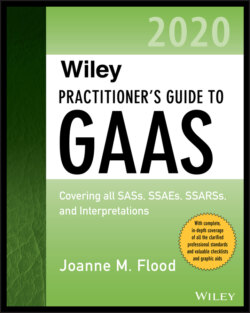Читать книгу Wiley Practitioner's Guide to GAAS 2020 - Joanne M. Flood - Страница 156
Significant Findings
ОглавлениеThe auditor should communicate the following matters:
The auditor’s views about qualitative aspects of the entity’s significant accounting practices, including accounting policies, accounting estimates, and financial statement disclosures.
Significant difficulties, if any, encountered during the audit.
Disagreements with management, if any.
Other findings or issues, if any, arising from the audit that are significant and relevant to those charged with governance.
(AU-C 260.12)
The auditor should communicate significant difficulties, if any, encountered during the audit; these may include:
Significant delays in management providing required information.
An unnecessarily brief time within which to complete the audit.
Extensive unexpected effort required to obtain sufficient appropriate audit evidence.
The unavailability of expected information.
Restrictions imposed on the auditors by management.
Management’s unwillingness to provide information about management’s plans for dealing with the adverse effects of the conditions or events that lead the auditor to believe there is substantial doubt about the entity’s ability to continue as a going concern.
(AU-C 260.A26)
The auditor should also communicate uncorrected misstatements, other than those the auditor believes are trivial. This information should include the effect they may have, individually or in the aggregate, on the auditor’s opinion. Material uncorrected misstatements should be identified individually, and the auditor should request that they be corrected. So, too, the auditor should communicate the effect of uncorrected misstatements related to prior periods. (AU-C 260.13)
Unless all those charged with governance are involved in managing the entity, the auditor also should communicate:
Material corrected misstatements that were brought to the attention of management as a result of audit procedures.
Written representations the auditor is requesting from management.
The auditor’s view of management’s consultations with other accountants.
Significant issues, if any, that were discussed, or the subject of correspondence, with management.
(AU-C 260.14)
